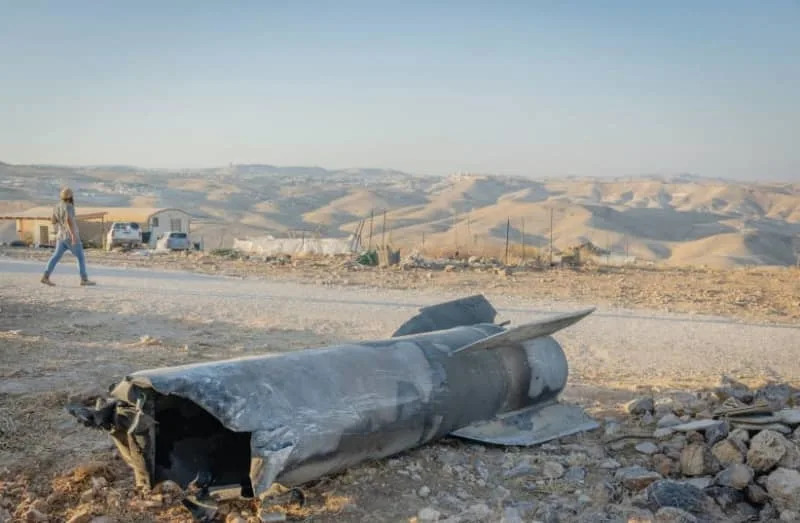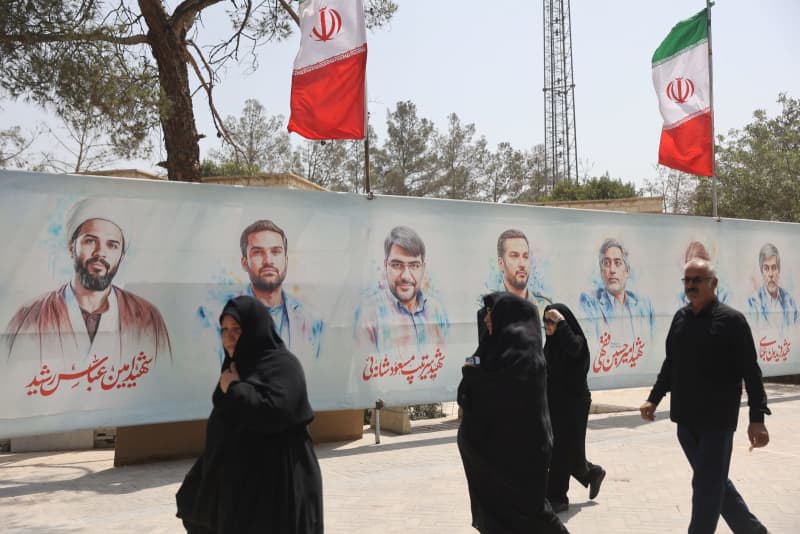When West condemned Iran it would escalate nuke violations. Now the West imposed its worst measure and Tehran has not countered yet.
Last Thursday, Germany, England, and France, the E3, started a 30-day countdown to activating the snapback of global sanctions against Iran.
Iran had vowed to retaliate by pulling itself out of the Non-Proliferation of Nuclear Weapons Treaty (NPT). It has not.
In fact, four days after the initial E3 snapback move, Tehran has not retaliated in any way.
This summarizes the new state of play after Israel and the United States bombed dozens of the Islamic Republic’s nuclear sites, setting it back about two years and billions of dollars in its quest for a nuclear weapon.
Iran Supreme Leader Ayatollah Ali Khamenei always thought it was crucial to retaliate even for many small insults by the West – an eye for an eye – to show Iran’s strength and to deter the West from this specific moment and action.
So, why is Iran silent?
REMAINS OF a ballistic missile fired from Iran in the recent war, June 29, 2025. (credit: FLASH90)
In truth, it is not silent.
There are lots of complaining and high-minded false claims of victimhood and being treated unfairly. But given that Khamenei is used to being the bully, why has he been silent regarding any practical consequences?
Probably because Khamenei has little with which to retaliate against the West at this point due to his eviscerated nuclear program.
If before theIsrael-Iran war in June, he could activate more centrifuges and enrich more uranium, Jerusalem’s and Washington’s attacks reduced those facilities to rubble.
So, Tehran could pull out of the NPT, but then what? Pulling out of the NPT is only a scary threat when made by a pre-June Iran. Then it could have tried to break out to a nuclear weapon using its fleet of about 20,000 centrifuges, including advanced ones, with many final-stage nuclear-weapons activities completed.
All of that leverage is gone.
Another time-honored trick by Khamenei would be to kick out the International Atomic Energy Agency (IAEA) nuclear inspectors. He has done that in successive stages over the past three years.
Sure, Iran let some IAEA inspectors back into their country last week to check out the entire civilian nuclear reactor in Bushehr. But until Khamenei gives the IAEA access to military nuclear facilities and the remaining enriched uranium it has, any cooperation has little more than symbolic value.
And that is what Iran is used to doing: stonewalling real concessions, threatening the other side, and providing just enough symbolic cooperation for the E3 to ask the US and Israel to restrain themselves to give diplomacy more time.
The jig is up after 10 years
Iran misjudged Israel’s and the US’s readiness to attack. It has now misjudged the E3’s determination to receive concrete nuclear concessions – and not just the old-school symbolic ones.
The Islamic Republic seems to be irrationally holding on for dear life to the futile hope that support from Russia, China, and other non-Western countries will help keep it humming in spite of global sanctions.
On that front, the situation has improved for Iran.
Before 2015, when international sanctions were imposed on Iran, China and Russia played according to the rules, because they and the world were more dependent on the US and the West. Since Moscow invaded Ukraine in 2022, Russia and China have decoupled much of this.
But global sanctions do not need to shutter Iran completely. They just need to push it further into the economic abyss that it has already been close to from certain sanctions that have remained on it since 2018, when the Mossad proved to the US that Iran was cheating on aspects of the nuclear deal.
In a rational world, Khamenei would have cut a new deal by now, either making real concessions or at least agreeing to extend the E3’s snapback tool for another six months to buy time for more negotiations.
But Tehran seems to be making decisions now out of anger and illusions of grandeur it aspired to just before the June war.
If the Islamic Republic does not opt for a new nuclear deal by around September 27, it will face new levels of economic pain, just as it is trying to pull itself up from the damage of the June war.
In that case, it may continue to fester, operating at lower threat levels. But it will not be able to progress again toward a nuclear weapon or the regional hegemony it so desired.
And if the festering goes on long enough, it is even possible that Israel may strike again, even without an immediate new threat – simply because Khamenei would be considered weaker, and the opportunity to push the Iranians even further away from posing a serious threat might be too hard to pass up.
